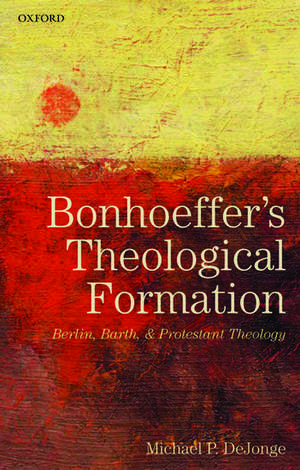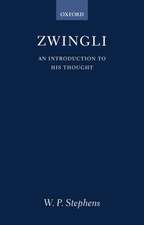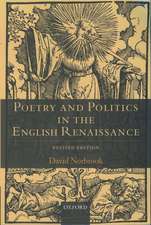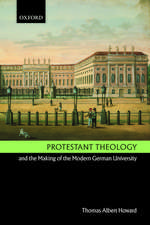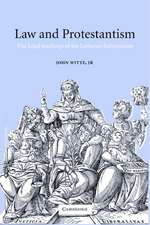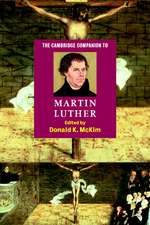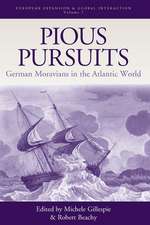Bonhoeffer's Theological Formation: Berlin, Barth, and Protestant Theology
Autor Michael P. DeJongeen Limba Engleză Hardback – 23 feb 2012
| Toate formatele și edițiile | Preț | Express |
|---|---|---|
| Paperback (1) | 219.09 lei 10-16 zile | |
| OUP OXFORD – 26 apr 2018 | 219.09 lei 10-16 zile | |
| Hardback (1) | 609.78 lei 31-37 zile | |
| OUP OXFORD – 23 feb 2012 | 609.78 lei 31-37 zile |
Preț: 609.78 lei
Preț vechi: 732.30 lei
-17% Nou
Puncte Express: 915
Preț estimativ în valută:
116.68€ • 122.15$ • 96.55£
116.68€ • 122.15$ • 96.55£
Carte tipărită la comandă
Livrare economică 27 martie-02 aprilie
Preluare comenzi: 021 569.72.76
Specificații
ISBN-13: 9780199639786
ISBN-10: 0199639787
Pagini: 176
Dimensiuni: 144 x 222 x 16 mm
Greutate: 0.34 kg
Editura: OUP OXFORD
Colecția OUP Oxford
Locul publicării:Oxford, United Kingdom
ISBN-10: 0199639787
Pagini: 176
Dimensiuni: 144 x 222 x 16 mm
Greutate: 0.34 kg
Editura: OUP OXFORD
Colecția OUP Oxford
Locul publicării:Oxford, United Kingdom
Recenzii
This is a welcome and profound monograph in Bonhoeffer studies because it addresses an oft-neglected, yet very important, piece of Bonhoeffer's theological legacy.
Bonhoeffer's Theological Formation serves as a helpful reader's guide to some of the most challenging conceptualitiesof Bonhoeffer's earliest theological work as reflected in Act and Being.
Bonhoeffer's Theological Formation is one of the best books that has been written on Bonhoefferâs theology. It makes a significant contribution to scholarly literature and is likely to be at the centre of debates about Bonhoefferâs early theology for quite some time.
Overall, Dejonge's impressive survey succeeds in showing how Bonhoeffer's theology of discipleship - and ultimately of martyrdom - was rooted in an understanding of the person of Jesus Christ that he developed early in his career.
In Bonhoeffers Theological Formation, Michael DeJonge presents students of Bonhoeffer with a crucial resource. Those familiar with Bonhoeffers theology will appreciate the discipline and the clarity with which DeJonge engages Bonhoeffers Habilitationschrift, Act and Being ... Few secondary resources on Bonhoeffer offer as much as does DeJonge's Bonhoeffers Theological Formation.
DeJonge helps us to see how Bonhoeffer went beyond Barths early theology and, in showing this, also clarifies how Bonhoeffer was able to articulate a theological ethic with deep resonances with Barth while moving beyond him in specific ways.
this is an excellent contribution to Bonhoeffer studies... DeJonge does a superb job of clearly presenting complex ideas in their historical and theological contexts. All those interested in the theology of Bonhoeffer, as well as the relationship between the theologies of Bonhoeffer and Barth will want to spend some time with this book.
Michael P. DeJonge has offered an insightful and exciting study focussed on Bonhoeffer's second dissertation in view of Systematic Theology in historical perspective. The clarity and precision with which DeJonge engages in his theological argument is matched by a keen awareness that any systematic claim has to ground itself in a clear understanding of its historical situation and critical reflection of its methodology a highly commendable text.
this patient investigation of Bonhoeffers early work is welcome, not least because it forces us to rethink Barths early work afresh.
This book will help readers understand Bonhoeffer's early theological thinking and formation, and ways that that thinking was carried into his later works such as Discipleship and his unfinished Ethics. Students of Bonhoeffer will find this an important contribution to understanding the influences that inform both his early and later works.
DeJonge has convincingly sketched the basi contours of the debate that animate Bonhoeffer's early theological development as a student and later lecturer at the University of Berlin.
Dejonge presents a first-class interpretation of Dietricht Bonhoeffer's complex thesis Act and Being.
Students will benefit greatly from DeJonges investigations of Sanctorum Communio, Act and Being, as well as of The Cost of Discipleship ... Most exciting is the appreciation of Bonhoeffers concept of revelation, of the church as Christus praesens in the world here and now. This takes the Catholic doctrine of the church as the body of Christ to new dimensions, as the various works of the German Roman Catholic theologian Ernst Feil (19322013) have attested, for example his The Theology of Dietrich Bonhoeffer (1985). DeJonges recent contribution is a further welcome enrichment of Bonhoeffer literature.
This relatively short addition to the ever-expanding literature on Dietrich Bonhoeffer's legacy is amongst the best. Not only is it an excellent account of Bonhoeffer's theological relationship with Karl Barth and of his own critical interpretation of the Lutheran confessional tradition of which he was so much a part, but it also locates him so well within 20th century Protestant theology ... DeJonge's finely balanced and well-written discussion of these issues makes them within the reach of anyone keen to understand Bonhoeffer's contribution to resolving them, and so to understanding his theological legacy.
... a welcome examination of Bonhoeffer's habilitation thesis, Act and Being. Before this slim volume was published in 2012, no thorough reading and interpretation of this piece of Bonhoeffer's oeuvre had appeared ... a volume tackling Act and Being has therefore been much needed, and Dejonge successfully makes his case about why this is so.
Bonhoeffer's Theological Formation serves as a helpful reader's guide to some of the most challenging conceptualitiesof Bonhoeffer's earliest theological work as reflected in Act and Being.
Bonhoeffer's Theological Formation is one of the best books that has been written on Bonhoefferâs theology. It makes a significant contribution to scholarly literature and is likely to be at the centre of debates about Bonhoefferâs early theology for quite some time.
Overall, Dejonge's impressive survey succeeds in showing how Bonhoeffer's theology of discipleship - and ultimately of martyrdom - was rooted in an understanding of the person of Jesus Christ that he developed early in his career.
In Bonhoeffers Theological Formation, Michael DeJonge presents students of Bonhoeffer with a crucial resource. Those familiar with Bonhoeffers theology will appreciate the discipline and the clarity with which DeJonge engages Bonhoeffers Habilitationschrift, Act and Being ... Few secondary resources on Bonhoeffer offer as much as does DeJonge's Bonhoeffers Theological Formation.
DeJonge helps us to see how Bonhoeffer went beyond Barths early theology and, in showing this, also clarifies how Bonhoeffer was able to articulate a theological ethic with deep resonances with Barth while moving beyond him in specific ways.
this is an excellent contribution to Bonhoeffer studies... DeJonge does a superb job of clearly presenting complex ideas in their historical and theological contexts. All those interested in the theology of Bonhoeffer, as well as the relationship between the theologies of Bonhoeffer and Barth will want to spend some time with this book.
Michael P. DeJonge has offered an insightful and exciting study focussed on Bonhoeffer's second dissertation in view of Systematic Theology in historical perspective. The clarity and precision with which DeJonge engages in his theological argument is matched by a keen awareness that any systematic claim has to ground itself in a clear understanding of its historical situation and critical reflection of its methodology a highly commendable text.
this patient investigation of Bonhoeffers early work is welcome, not least because it forces us to rethink Barths early work afresh.
This book will help readers understand Bonhoeffer's early theological thinking and formation, and ways that that thinking was carried into his later works such as Discipleship and his unfinished Ethics. Students of Bonhoeffer will find this an important contribution to understanding the influences that inform both his early and later works.
DeJonge has convincingly sketched the basi contours of the debate that animate Bonhoeffer's early theological development as a student and later lecturer at the University of Berlin.
Dejonge presents a first-class interpretation of Dietricht Bonhoeffer's complex thesis Act and Being.
Students will benefit greatly from DeJonges investigations of Sanctorum Communio, Act and Being, as well as of The Cost of Discipleship ... Most exciting is the appreciation of Bonhoeffers concept of revelation, of the church as Christus praesens in the world here and now. This takes the Catholic doctrine of the church as the body of Christ to new dimensions, as the various works of the German Roman Catholic theologian Ernst Feil (19322013) have attested, for example his The Theology of Dietrich Bonhoeffer (1985). DeJonges recent contribution is a further welcome enrichment of Bonhoeffer literature.
This relatively short addition to the ever-expanding literature on Dietrich Bonhoeffer's legacy is amongst the best. Not only is it an excellent account of Bonhoeffer's theological relationship with Karl Barth and of his own critical interpretation of the Lutheran confessional tradition of which he was so much a part, but it also locates him so well within 20th century Protestant theology ... DeJonge's finely balanced and well-written discussion of these issues makes them within the reach of anyone keen to understand Bonhoeffer's contribution to resolving them, and so to understanding his theological legacy.
... a welcome examination of Bonhoeffer's habilitation thesis, Act and Being. Before this slim volume was published in 2012, no thorough reading and interpretation of this piece of Bonhoeffer's oeuvre had appeared ... a volume tackling Act and Being has therefore been much needed, and Dejonge successfully makes his case about why this is so.
Notă biografică
Michael P. DeJonge is Associate Professor of Religious Studies at the University of South Florida, where he teaches on the history of Christian theology and topics in modern religious thought. His publications include Bonhoeffer on Resistance: The Word Against the Wheel (2018), Bonhoeffer's Reception of Luther (2017), and The Bonhoeffer Reader (co-edited with Clifford J. Green; 2014).
